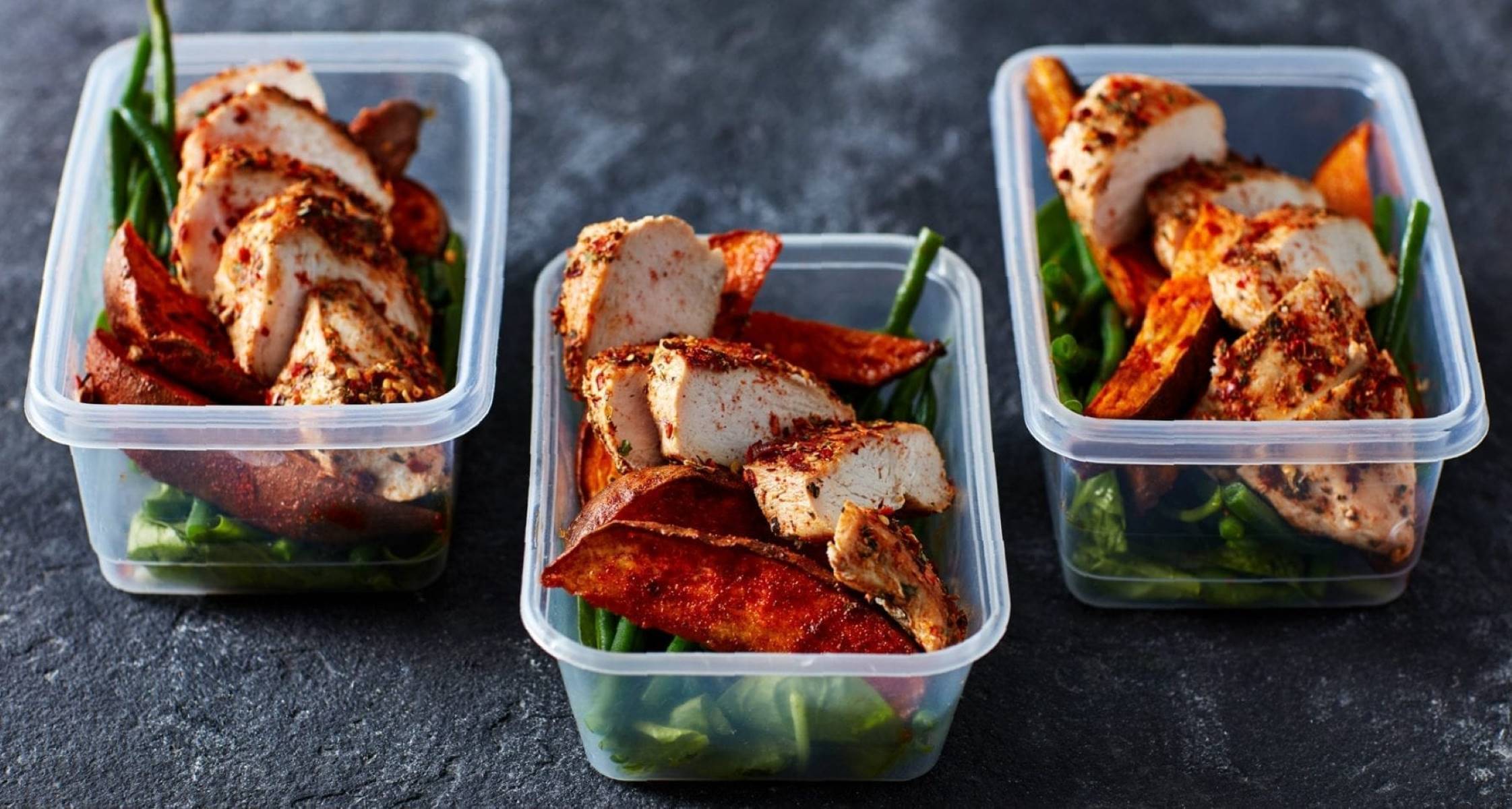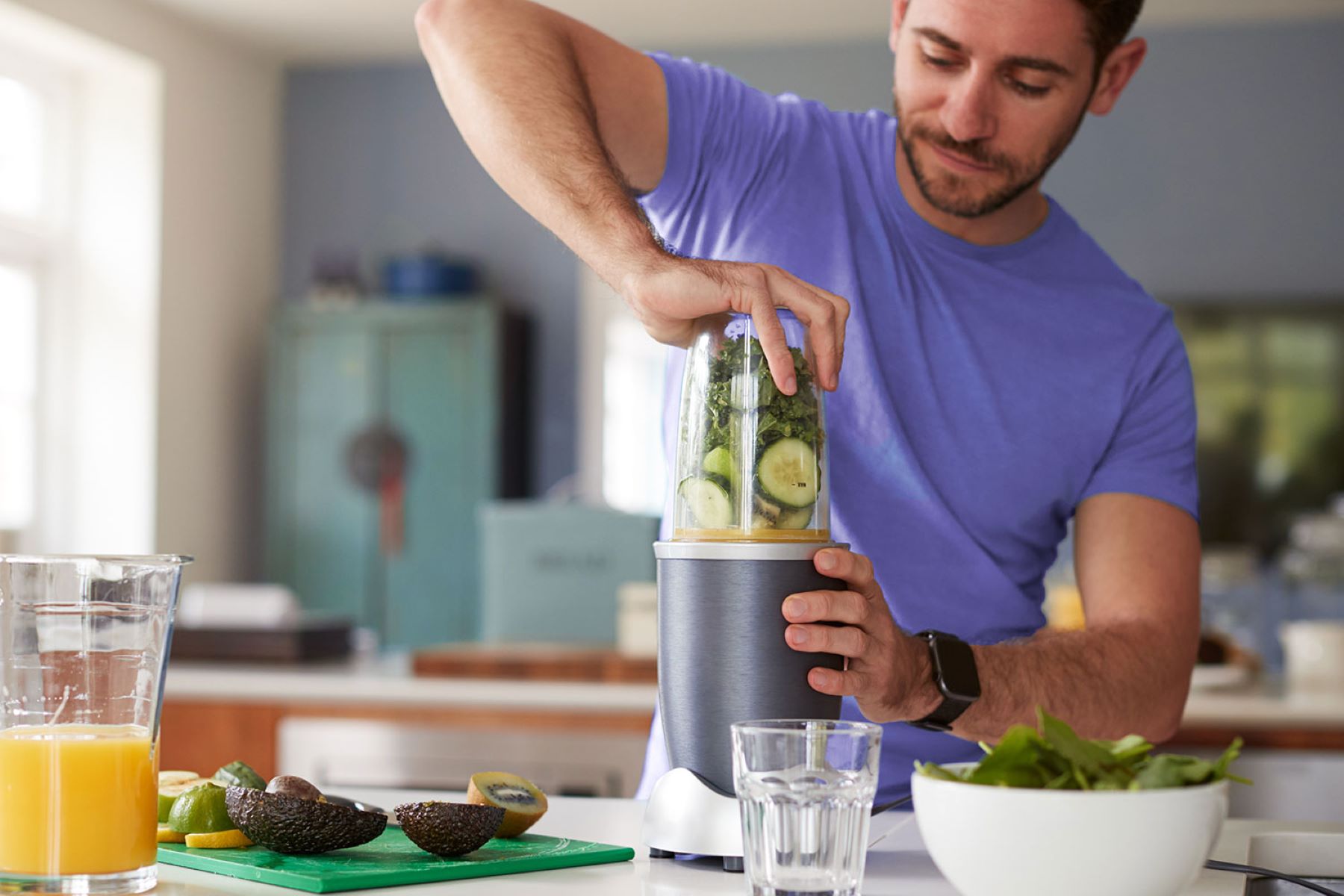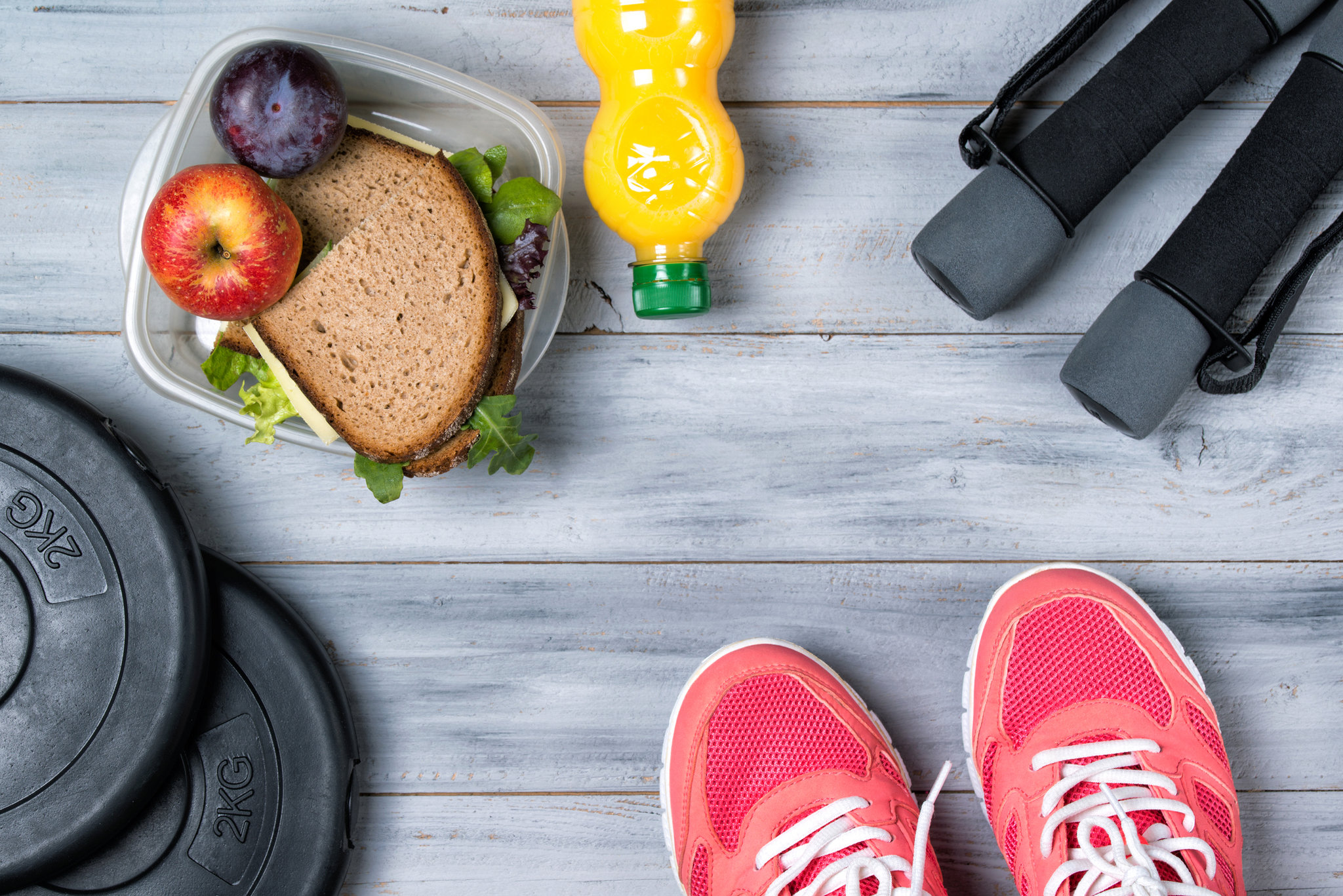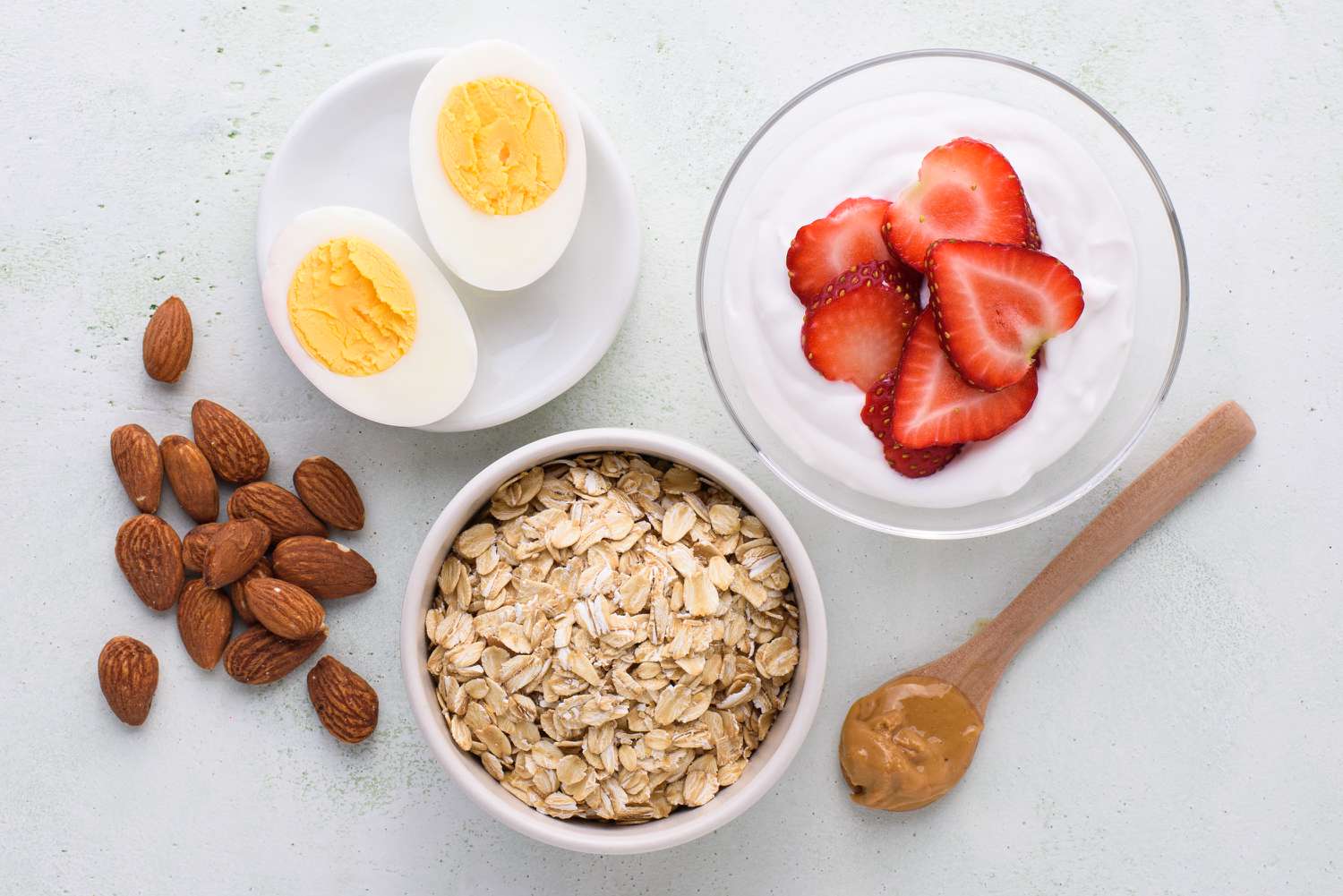

Featured
What Should I Eat After A Workout
Modified: August 19, 2023
Discover the perfect post-workout meal options to fuel your body and optimize recovery. Explore our featured recipes designed to nourish and replenish after intense exercise.
Introduction
When it comes to optimizing your workout results, exercise is just one piece of the puzzle. One often overlooked aspect is post-workout nutrition. What you eat after a workout can greatly impact your recovery, muscle growth, and overall performance.
After a strenuous workout, your body is in a state of depletion. It has used up its energy stores and broken down muscle tissue. In order to kickstart the recovery process, it’s crucial to provide your body with the nutrients it needs to repair, rebuild, and refuel.
Post-workout nutrition has two main goals: replenishing glycogen stores and promoting muscle protein synthesis. Glycogen, which is stored in your muscles, is the primary fuel source during exercise. Consuming carbohydrates after a workout helps restore these glycogen stores, providing your body with the energy it needs for future workouts.
Muscle protein synthesis, on the other hand, is the process of building and repairing muscle tissue. Engaging in resistance training breaks down muscle fibers, and consuming protein post-workout helps stimulate the synthesis of new muscle protein, leading to muscle growth and recovery.
But it’s not just about loading up on protein and carbohydrates. Post-workout nutrition should also include essential micronutrients, such as vitamins and minerals, to support overall health and optimal functioning of the body.
In this article, we will explore the importance of post-workout nutrition, different macronutrient options, the role of healthy fats, the significance of hydration, and the impact of meal timing and frequency. Additionally, we’ll discuss pre-packaged post-workout snacks as a convenient option. By understanding the impact of nutrition on post-workout recovery, you can make informed choices to maximize your fitness gains.
Importance of Post-Workout Nutrition
Post-workout nutrition plays a vital role in maximizing the benefits of your exercise routine. While the immediate focus may be on the physical exertion during a workout, what you do afterward is equally important for optimizing recovery, building muscle, and improving overall performance.
One of the primary reasons why post-workout nutrition is crucial is because it helps replenish energy stores. During exercise, your body uses up its glycogen stores – the stored form of carbohydrates in your muscles. Consuming carbohydrates after a workout helps replenish these stores, ensuring that your body has enough fuel for your next training session. Failing to replenish glycogen stores adequately can lead to decreased energy levels, reduced workout intensity, and slower recovery.
Another key aspect of post-workout nutrition is promoting muscle protein synthesis. When you engage in resistance training, you create micro-tears in your muscle fibers. Consuming protein after a workout provides the building blocks needed for your body to repair and rebuild these muscle fibers, leading to muscle growth and improved strength. The timing of protein consumption is particularly important, as there is a post-workout window of opportunity when your muscles are primed to absorb and utilize protein efficiently.
In addition to replenishing energy stores and promoting muscle recovery, post-workout nutrition also aids in reducing muscle soreness. Certain foods, such as antioxidant-rich fruits and vegetables, have anti-inflammatory properties that can help alleviate the post-workout muscle soreness commonly known as DOMS (delayed onset muscle soreness). Including these foods in your post-workout meals can help speed up the recovery process and minimize discomfort.
Furthermore, post-workout nutrition plays a crucial role in supporting the immune system. Intense exercise can temporarily suppress the immune system, making you more susceptible to illness and infection. Consuming a well-balanced meal or snack after a workout provides the necessary nutrients to support your immune system and enhance overall health.
In summary, post-workout nutrition is essential for replenishing energy stores, promoting muscle protein synthesis, reducing muscle soreness, and supporting a healthy immune system. By focusing on proper nutrition after your workouts, you can enhance recovery, optimize muscle growth, and improve your overall fitness performance.
Macros vs. Micronutrients
When it comes to post-workout nutrition, it’s important to understand the distinction between macronutrients and micronutrients. Both play crucial roles in supporting your body’s recovery and overall health, but they serve different purposes.
Macronutrients refer to the three main components of your diet: carbohydrates, proteins, and fats. These are the nutrients that provide your body with energy in the form of calories. Each macronutrient has specific roles and functions in post-workout nutrition.
Carbohydrates are essential for replenishing glycogen stores in your muscles. They provide a readily available source of energy and assist in preventing muscle breakdown. Good sources of carbohydrates for post-workout meals include fruits, vegetables, whole grains, and starchy vegetables like sweet potatoes.
Proteins are the building blocks of muscle tissue and are crucial for muscle recovery and growth. Consuming protein post-workout helps stimulate muscle protein synthesis, promoting muscle repair. Opt for lean sources of protein such as chicken, fish, tofu, or protein-rich plant-based options like lentils and quinoa.
Fats, although often vilified, are an important part of a balanced post-workout meal. They provide essential fatty acids that support hormone production and help maintain a healthy metabolism. Incorporate healthy fats from sources like avocados, nuts, seeds, and olive oil into your meals.
While macronutrients supply your body with energy and building blocks, micronutrients refer to vitamins and minerals. These are essential for various physiological processes and ensure proper functioning of your body. Post-workout meals should also include a variety of nutrient-dense foods to fulfill your micronutrient needs.
Vitamins, such as vitamin C, vitamin E, and B vitamins, play important roles in recovery and reducing oxidative stress caused by intense exercise. Minerals like magnesium, potassium, and calcium are crucial for muscle contraction, electrolyte balance, and bone health. Including fruits, vegetables, nuts, and seeds in your post-workout meals helps ensure an adequate intake of these vital micronutrients.
While macronutrients provide the necessary fuel and building blocks for your body, micronutrients support overall well-being and help optimize post-workout recovery. A balanced post-workout meal should incorporate both macronutrients and micronutrients to ensure proper nutrition and enhance your fitness gains.
Protein-Rich Options
Protein is a vital macronutrient for muscle repair and recovery after a workout. Including protein-rich foods in your post-workout meal or snack is crucial for stimulating muscle protein synthesis, supporting muscle growth, and enhancing overall recovery.
Here are some excellent protein-rich options to incorporate into your post-workout nutrition plan:
- Chicken breast: Chicken breast is a lean source of protein, low in fat, and high in essential amino acids. It provides around 25 grams of protein per 3-ounce serving, making it an ideal choice for muscle repair and growth.
- Salmon: Salmon is not only a great source of protein but also packed with omega-3 fatty acids, which have anti-inflammatory properties. It offers around 22 grams of protein per 3-ounce serving, along with heart-healthy fats.
- Greek yogurt: Greek yogurt is not only rich in protein but also contains probiotics that support gut health. It offers approximately 20 grams of protein per 6-ounce serving. Choose plain Greek yogurt and add your own toppings like fruits or nuts to avoid added sugars.
- Eggs: Eggs are a convenient and affordable source of protein. They are also packed with nutrients like vitamin D and antioxidants. One large egg contains around 6 grams of protein. Enjoy them boiled, scrambled, or in an omelet for a quick and protein-packed post-workout option.
- Cottage cheese: Cottage cheese is a high-protein option that also provides calcium for bone health. It offers around 14 grams of protein per half-cup serving. Pair it with fruits or seeds for added flavor and nutrients.
- Plant-based protein options: If you follow a vegetarian or vegan diet, there are several plant-based protein sources available. Foods such as lentils, chickpeas, quinoa, tofu, and tempeh offer substantial amounts of protein and can be incorporated into post-workout meals.
Remember, the timing of protein consumption is crucial for maximizing its benefits. Aim to consume protein within the post-workout window, ideally within 30 minutes to an hour after your workout. This gives your muscles the necessary nutrients to start the repair and recovery process.
Incorporating protein-rich options into your post-workout nutrition plan not only supports muscle repair and growth but also helps keep you feeling fuller for longer. This can aid in weight management and prevent excessive snacking or overeating later in the day.
Experiment with different protein sources and recipes to keep your post-workout meals delicious and exciting. By prioritizing protein intake, you’ll optimize your post-workout recovery and accelerate progress towards your fitness goals.
Carbohydrate-Rich Options
Carbohydrates are an essential macronutrient for replenishing glycogen stores and providing energy after a workout. Including carbohydrate-rich options in your post-workout nutrition plan is crucial for maintaining optimal performance, enhancing recovery, and preparing your body for future workouts.
Here are some excellent carbohydrate-rich options to consider incorporating into your post-workout meals or snacks:
- Quinoa: Quinoa is a nutrient-dense grain that provides both carbohydrates and protein. It is also gluten-free and rich in fiber. One cup of cooked quinoa contains approximately 40 grams of carbohydrates.
- Sweet potatoes: Sweet potatoes are a nutritious and delicious carbohydrate source. They are high in fiber, vitamins, and minerals. One medium-sized sweet potato provides around 26 grams of carbohydrates.
- Fruits: Fruits such as bananas, berries, oranges, and pineapple are excellent sources of natural carbohydrates. They are also rich in vitamins, minerals, and antioxidants. Enjoy a piece of fruit or add them to a post-workout smoothie for a refreshing and nutritious carbohydrate boost.
- Oats: Oats are a whole grain that offers a slow-release source of carbohydrates. They are also high in fiber, which aids in digestion. One cup of cooked oats provides around 30 grams of carbohydrates.
- Whole grain bread or crackers: Whole grain bread or crackers are convenient options for quick and easy post-workout carbohydrates. They offer a combination of carbohydrates, fiber, and some protein. Choose whole grain options to maximize nutritional value.
- Rice: White or brown rice is a versatile carbohydrate option. It is easily digestible and provides a quick source of energy. Half a cup of cooked rice contains around 20-25 grams of carbohydrates, depending on the variety.
It’s essential to choose complex carbohydrates that are minimally processed and rich in fiber. These carbohydrates are digested more slowly, providing a sustained release of energy and helping to stabilize blood sugar levels. This can prevent energy crashes and hunger pangs after your workout.
Timing your carbohydrate intake is also important. Consuming carbohydrates within the post-workout window helps replenish glycogen stores more effectively. Aim to include carbohydrates in your post-workout meal or snack alongside protein for optimal recovery and muscle repair.
Keep in mind that the amount of carbohydrates you need will vary depending on factors such as exercise intensity, duration, and individual goals. It’s best to consult with a registered dietitian or nutritionist to determine the appropriate carbohydrate intake for your specific needs.
Incorporating carbohydrate-rich options into your post-workout nutrition plan ensures that you have the energy to perform at your best, supports recovery, and prepares your body for future workouts.
Healthy Fats for Post-Workout Recovery
While carbohydrates and protein often take the spotlight in post-workout nutrition, healthy fats also play a crucial role in supporting recovery and optimizing performance. Including sources of healthy fats in your post-workout meals can provide numerous benefits for your body.
Here are some healthy fat options to consider incorporating into your post-workout nutrition plan:
- Avocado: Avocados are a nutrient-rich source of healthy fats, particularly monounsaturated fats. They also provide fiber, vitamins, and minerals. Adding avocado to salads, sandwiches, or smoothies can help improve satiety and provide a creamy texture.
- Nuts and seeds: Almonds, walnuts, chia seeds, flaxseeds, and hemp seeds are all rich in healthy fats, including omega-3 fatty acids. They provide a satisfying crunch and are great additions to salads, yogurts, or post-workout trail mixes.
- Olive oil: Olive oil is a staple in Mediterranean cuisine and is rich in monounsaturated fats. It can be used as a dressing for salads or as a finishing oil for cooked dishes to add flavor and healthy fats.
- Nut butter: Natural nut butter, such as almond or peanut butter, is a delicious source of healthy fats and protein. Spread it on whole grain bread, add it to smoothies or use it as a dip for fruits or vegetables for a satisfying post-workout snack.
- Fatty fish: Fatty fish like salmon, mackerel, and sardines are excellent sources of omega-3 fatty acids, which have anti-inflammatory properties. These healthy fats can aid in reducing post-exercise muscle soreness and promote overall recovery.
- Coconut: Coconut is a versatile source of healthy fats, providing medium-chain triglycerides (MCTs). MCTs are easily digested and can provide a quick source of energy for your body. Incorporate coconut oil, coconut milk, or shredded coconut into post-workout smoothies or curries.
Healthy fats serve as a concentrated form of energy and help with the absorption of fat-soluble vitamins. They also support hormone production, assist in reducing inflammation, and promote overall cardiovascular health.
It’s important to remember that while healthy fats are beneficial, they are also calorie-dense. Be mindful of portion sizes to ensure that you’re not consuming an excessive amount of calories. Incorporate a moderate amount of healthy fats into your post-workout meals to reap their benefits without overdoing it.
Experiment with different combinations of healthy fats to keep your meals interesting and enjoyable. Incorporating sources of healthy fats in your post-workout nutrition plan can help satisfy your hunger, support recovery, and provide a well-rounded and balanced approach to overall nutrition.
Hydration and Electrolyte Replenishment
Proper hydration is essential for optimal performance and recovery during and after a workout. Sweat loss during exercise can result in fluid and electrolyte imbalances, which can negatively impact your body’s ability to function efficiently. To support post-workout recovery, it’s crucial to focus on both hydration and electrolyte replenishment.
Here are some key points to consider for post-workout hydration:
- Water: Water is the simplest and most important component of post-workout hydration. Replacing the fluids lost through sweat is crucial for maintaining hydration levels. Aim to drink an adequate amount of water to compensate for your fluid losses during exercise.
- Electrolytes: Electrolytes are minerals that help regulate various bodily processes, including fluid balance and muscle function. Common electrolytes include sodium, potassium, magnesium, and calcium. When you sweat, you also lose electrolytes. Replenishing these electrolytes is crucial to restore balance and support proper muscle and nerve function.
- Sports drinks: For intense or prolonged workouts lasting longer than an hour, sports drinks can be beneficial. These drinks contain a combination of water, carbohydrates, and electrolytes to help replenish fluids and provide a source of energy. However, for shorter workouts, sticking to water and obtaining electrolytes from food sources may be sufficient.
- Coconut water: Coconut water is a natural and hydrating alternative to sports drinks. It is rich in potassium, magnesium, and other electrolytes. It can be a refreshing post-workout option, especially for those looking for a natural and lower sugar alternative.
- Food sources: Consuming foods rich in electrolytes can also aid in replenishing these essential minerals. Foods like bananas, oranges, yogurt, spinach, and nuts contain electrolytes such as potassium, calcium, and magnesium. Including them in your post-workout meals or snacks can help support electrolyte replenishment.
Monitoring your urine color can be a helpful indicator of hydration levels. A pale yellow color indicates adequate hydration, while a darker yellow color may indicate dehydration and the need for increased fluid intake.
Remember, staying properly hydrated throughout the day, not just during and after your workouts, is crucial for maintaining overall hydration levels. Aim to drink water regularly, listen to your body’s thirst signals, and adjust your fluid intake accordingly based on the intensity and duration of your workouts.
By prioritizing hydration and electrolyte replenishment, you can optimize post-workout recovery, prevent dehydration, and support your body’s ability to perform at its best.
Meal Timing and Frequency
Meal timing and frequency play a significant role in post-workout nutrition. Properly timing your meals and snacks can enhance recovery, replenish energy stores, and optimize muscle protein synthesis. Consider the following guidelines when planning your post-workout meals.
Timing: Consuming a post-workout meal or snack within the “anabolic window” – typically 30 minutes to 2 hours after your workout – is crucial. During this time, your muscles are more receptive to nutrient uptake, making it an ideal opportunity to replenish glycogen stores and stimulate muscle protein synthesis.
If you prefer larger meals, aim to have a well-balanced meal within 1-2 hours after your workout. On the other hand, if you prefer smaller, more frequent meals, you can have a smaller post-workout meal or snack immediately after your workout and follow up with a regular meal a few hours later.
Macronutrient balance: Your post-workout meal or snack should contain a combination of carbohydrates and proteins. Carbohydrates help replenish glycogen stores, while protein supports muscle repair and growth. Aim for a ratio of 3:1 or 4:1 of carbohydrates to protein to maximize recovery and muscle protein synthesis.
Pre-workout and post-workout meals: It’s also important to consider your pre-workout meal when planning your post-workout nutrition. Consume a balanced meal containing carbohydrates, protein, and healthy fats 2-3 hours before your workout to provide sustained energy. The post-workout meal can then focus on replenishing energy stores and promoting muscle recovery.
Snacks: If your workout duration is shorter or you prefer to snack after your workout, opt for a well-rounded snack that includes both carbohydrates and protein. Examples include a banana with nut butter, Greek yogurt with berries, or a protein smoothie with added fruits or vegetables.
Individual preferences: It’s important to listen to your body and consider your individual preferences when planning post-workout meals. Some people may have specific dietary restrictions or preferences that need to be taken into account. Experiment with different meal timing and frequency strategies to find what works best for you and fits well with your lifestyle.
Remember to stay consistent with your meal timing and frequency, as this can help regulate your metabolism and ensure a steady supply of nutrients for optimal recovery and performance. Additionally, be mindful of portion sizes and adjust accordingly based on your goals and activity level.
By paying attention to meal timing and frequency, and incorporating well-balanced post-workout meals or snacks, you can maximize the benefits of your workouts and support your body’s recovery and growth.
Pre-Packaged Post-Workout Snacks
Pre-packaged post-workout snacks can be a convenient option for those who are always on the go or prefer a quick and easy option after their workouts. While whole foods should always be prioritized, there are some pre-packaged snacks available that can offer a balanced combination of macronutrients and micronutrients to support recovery and replenishment. Here are some pre-packaged post-workout snack options to consider:
- Protein bars: Protein bars come in various flavors and formulations, making them a popular choice for post-workout snacks. Look for bars that are low in added sugars, contain a good balance of protein and carbohydrates, and are made with wholesome ingredients.
- Trail mix: Pre-packaged trail mix or nut mixes can provide a satisfying combination of protein, carbohydrates, and healthy fats. Look for brands that offer a mix of nuts, seeds, and dried fruits without added sugars or excessive sodium.
- Beef or turkey jerky: Jerky made from lean meats like beef or turkey can be a portable and protein-rich option. Look for brands that use minimal additives and preservatives and have lower sodium content.
- Rice cakes: Rice cakes are a light and easily digestible snack that can be paired with nut butter or topped with avocado for added flavor and nutrients. Look for whole grain rice cakes with minimal added ingredients.
- Greek yogurt cups: Pre-portioned Greek yogurt cups are a convenient source of protein and can be consumed directly after a workout. Choose brands that are low in added sugars and opt for plain varieties to control the sweetness and add your own toppings like fruits or nuts.
- Fruit and nut bars: Fruit and nut bars are typically made with dried fruits, nuts, and seeds, providing a combination of carbohydrates, healthy fats, and fiber. Look for varieties that are minimally processed and have no added sugars or artificial ingredients.
While pre-packaged snacks can provide convenience, it’s important to read labels and choose options that align with your nutritional goals. Pay attention to the ingredient list, nutritional content, and portion size to ensure that the snacks fit into your overall diet plan.
Additionally, it’s always a good idea to have whole foods as the foundation of your post-workout nutrition. Fresh fruits, vegetables, lean proteins, and whole grains offer a wide range of nutrients and are less processed compared to pre-packaged options. However, having pre-packaged snacks on hand can be helpful for times when whole foods are not readily available or when you need a quick and portable option.
Remember to stay mindful of portion sizes and avoid relying solely on pre-packaged snacks as your primary source of post-workout nutrition. Incorporating a variety of whole foods, along with occasional use of pre-packaged snacks, can help ensure a well-rounded and balanced approach to post-workout refueling.
Conclusion
Post-workout nutrition is an essential component of optimizing your fitness journey. By focusing on proper nutrition after a workout, you can enhance recovery, promote muscle growth, replenish energy stores, and prepare your body for future workouts.
Macronutrients, such as carbohydrates, proteins, and healthy fats, play vital roles in post-workout nutrition. Carbohydrates replenish glycogen stores, proteins support muscle repair and growth, and healthy fats provide energy and support overall health. Including a balance of all three macronutrients in your post-workout meals or snacks is crucial for maximizing the benefits of your exercise routine.
Micronutrients, including vitamins and minerals, are essential for various physiological processes and support overall well-being. Prioritizing nutrient-dense foods, such as fruits, vegetables, nuts, and seeds, ensures that you’re not only meeting your macronutrient needs but also fulfilling your micronutrient requirements for optimal recovery and health.
Hydration and electrolyte replenishment are equally important aspects of post-workout nutrition. Water and electrolytes help maintain fluid balance, support muscle function, and regulate various bodily processes. Paying attention to your hydration levels and replenishing electrolytes through both food and beverages can enhance recovery and prevent dehydration.
Timing your meals and snacks, as well as considering the frequency of your meals, is key for maximizing post-workout nutrition. Consuming a well-balanced meal or snack within the post-workout window ensures that your body receives the necessary nutrients to kickstart the recovery process and promote muscle protein synthesis. Finding a meal timing and frequency strategy that works best for your schedule and preferences is essential for consistency and long-term success.
While whole foods should always be prioritized, pre-packaged post-workout snacks can offer convenience on occasions when whole foods are not readily available. Choose snacks that are made with wholesome ingredients, have a good balance of macronutrients, and align with your nutritional goals.
Incorporating these post-workout nutrition principles into your routine will help you recover more effectively, support muscle growth, and enhance performance. Remember, everyone’s nutritional needs may vary based on factors such as training intensity, goals, and individual preferences. Consult with a registered dietitian or nutritionist to personalize your post-workout nutrition plan and optimize your fitness journey.









